Imagine stepping beyond the screen and into a persistent, shared digital world where you can interact with others, work, play, create, and even transact. That’s the promise of the metaverse, a concept that’s rapidly evolving and capturing the imagination of individuals and businesses alike. But what exactly is the metaverse, and how will it impact our lives? This blog post delves into the metaverse, exploring its potential, challenges, and implications for the future.
Understanding the Metaverse
The metaverse isn’t a single technology or platform; it’s a convergence of technologies, including virtual reality (VR), augmented reality (AR), blockchain, artificial intelligence (AI), and the internet itself. Think of it as the next iteration of the internet – a more immersive and interactive experience.
Key Characteristics of the Metaverse
The metaverse possesses several key characteristics that distinguish it from the current internet:
- Persistence: The metaverse doesn’t “reset” or end when you log off. It continues to exist and evolve even when you’re not actively participating.
- Real-time Interactivity: Users can interact with each other and with the virtual environment in real-time, fostering a sense of presence and community.
- User-Generated Content: The metaverse is largely built upon user-generated content, empowering individuals to create and share their own experiences, assets, and worlds.
- Virtual Economies: The metaverse supports virtual economies, often powered by blockchain technology and cryptocurrencies, allowing users to buy, sell, and trade digital assets.
- Social Presence: Users are represented by avatars, allowing them to express themselves and interact with others in a virtual social environment.
- Interoperability (Ideal): Ideally, different metaverses should be interoperable, allowing users to seamlessly move between them with their avatars and digital assets. This is a challenging aspect currently under development.
Current Examples of Metaverse Platforms
While a fully realized, singular metaverse doesn’t yet exist, several platforms offer metaverse-like experiences:
- Roblox: A popular platform primarily among younger audiences, allowing users to create and play games within a shared virtual world.
- Fortnite: More than just a game, Fortnite hosts virtual concerts, events, and social gatherings, blurring the lines between gaming and social interaction.
- Decentraland: A decentralized, user-owned virtual world built on the Ethereum blockchain, where users can buy, sell, and develop virtual land.
- The Sandbox: Another blockchain-based metaverse platform where users can create, own, and monetize their gaming experiences and digital assets.
- Horizon Worlds (Meta): Meta’s social VR platform, offering users the ability to create and explore virtual worlds, attend events, and interact with others using Oculus VR headsets.
The Potential of the Metaverse
The metaverse has the potential to revolutionize numerous aspects of our lives, from how we work and learn to how we socialize and entertain ourselves.
Transforming Work and Education
The metaverse can provide immersive and engaging experiences for both work and education:
- Virtual Collaboration: Remote teams can collaborate in shared virtual workspaces, fostering a greater sense of connection and productivity. Imagine architects reviewing building plans in a 3D virtual model, or surgeons practicing complex procedures in a risk-free simulated environment.
- Immersive Learning: Students can learn through interactive simulations and virtual field trips, making education more engaging and memorable. For example, history students could explore ancient Rome in a virtual recreation, or science students could dissect a virtual frog without any ethical concerns.
- Virtual Training: Companies can use the metaverse to train employees in realistic scenarios, reducing the cost and risk associated with traditional training methods. For instance, firefighters can practice putting out virtual fires in a controlled environment.
Revolutionizing Entertainment and Socialization
The metaverse offers new and exciting possibilities for entertainment and social interaction:
- Virtual Concerts and Events: Attend concerts, festivals, and other events in the metaverse, interacting with performers and other fans in real-time. Ariana Grande’s virtual concert in Fortnite drew millions of viewers, demonstrating the potential of this format.
- Virtual Tourism: Explore distant lands, historical sites, and even fictional worlds from the comfort of your home. Imagine virtually visiting the Great Wall of China or the surface of Mars.
- Social Gatherings: Connect with friends and family in virtual spaces, playing games, watching movies, or simply chatting in a shared environment.
New Economic Opportunities
The metaverse creates new opportunities for businesses and individuals to generate income:
- Virtual Real Estate: Buy, sell, and develop virtual land in metaverse platforms, creating virtual businesses, residential areas, or entertainment venues.
- Digital Asset Creation: Create and sell digital assets, such as avatars, clothing, artwork, and music, in virtual marketplaces.
- Metaverse Jobs: New jobs are emerging in the metaverse, including virtual world developers, avatar designers, event planners, and community managers.
Challenges and Concerns
Despite its potential, the metaverse faces several challenges and raises important concerns that need to be addressed.
Technological Limitations
Current technology still has limitations in terms of accessibility, performance, and user experience:
- Hardware Requirements: Accessing the metaverse often requires expensive VR headsets and powerful computers, limiting its accessibility to a wider audience.
- Latency and Bandwidth: Real-time interaction in the metaverse requires low latency and high bandwidth, which may not be available in all locations.
- User Interface and Experience: Navigating and interacting with the metaverse can be clunky and unintuitive, especially for new users.
Privacy and Security Risks
The metaverse raises significant privacy and security concerns:
- Data Collection: Metaverse platforms collect vast amounts of user data, including biometric data, which could be vulnerable to breaches and misuse.
- Identity Theft: Users are at risk of identity theft and impersonation in the metaverse, potentially leading to financial losses or reputational damage.
- Online Harassment and Bullying: The metaverse can be a breeding ground for online harassment and bullying, requiring effective moderation and safety measures.
Ethical and Societal Implications
The metaverse raises important ethical and societal questions:
- Digital Divide: The metaverse could exacerbate the digital divide, creating a gap between those who have access to and can afford metaverse technologies and those who do not.
- Addiction and Escapism: The immersive nature of the metaverse could lead to addiction and escapism, potentially affecting users’ mental health and real-world relationships.
- Regulation and Governance: The metaverse requires new forms of regulation and governance to address issues such as intellectual property rights, consumer protection, and content moderation.
Investing in the Metaverse
Many investors are eager to capitalize on the growth of the metaverse. There are several ways to invest in the metaverse, each with its own risks and rewards.
Investing in Metaverse-Related Stocks
Consider investing in companies that are actively developing metaverse technologies and platforms:
- Meta Platforms (Facebook): Developing Horizon Worlds and investing heavily in VR and AR technologies.
- Microsoft: Developing Mesh for Teams and integrating metaverse features into its products and services.
- Nvidia: Providing the graphics processing units (GPUs) and software platforms that power the metaverse.
- Unity Software: Providing the game engine and development tools used to create metaverse experiences.
- Roblox Corporation: Operating a popular metaverse platform where users can create and play games.
Investing in Cryptocurrencies and NFTs
Consider investing in cryptocurrencies and non-fungible tokens (NFTs) associated with metaverse platforms:
- Ethereum (ETH): The blockchain platform that supports many metaverse projects and NFTs.
- Decentraland (MANA): The native cryptocurrency of Decentraland, used to buy and sell virtual land and assets.
- The Sandbox (SAND): The native cryptocurrency of The Sandbox, used to buy and sell virtual land and assets.
- NFTs: Collectible digital assets that represent ownership of unique items in the metaverse, such as avatars, artwork, and virtual real estate.
Investing in Metaverse ETFs
Exchange-Traded Funds (ETFs) offer a diversified way to invest in the metaverse:
- Roundhill Ball Metaverse ETF (META): Tracks the performance of companies involved in the metaverse.
- ProShares Metaverse Theme ETF (VERS): Invests in companies that are developing metaverse technologies and applications.
- Disclaimer:* Investing in the metaverse involves risks, and it’s essential to do your research and consult with a financial advisor before making any investment decisions.
Conclusion
The metaverse is a rapidly evolving concept with the potential to transform our lives in profound ways. While it faces significant challenges and raises important concerns, its potential benefits for work, education, entertainment, and economic opportunity are undeniable. By understanding the key characteristics of the metaverse, the challenges it faces, and the ways to invest in it, we can better prepare for and shape the future of this exciting technology. As the metaverse continues to develop, it’s crucial to address the ethical and societal implications to ensure that it benefits all of humanity.



